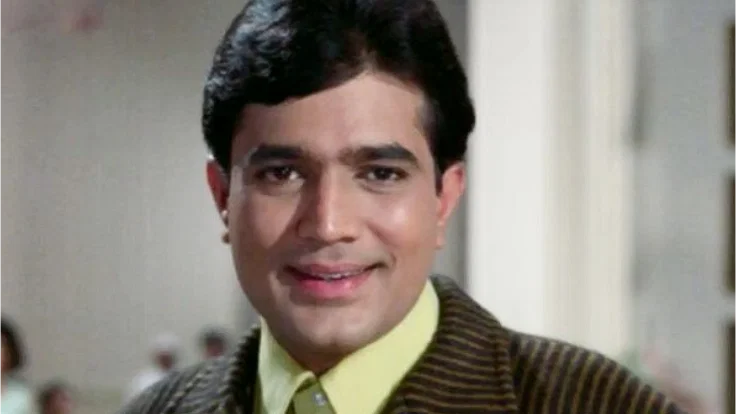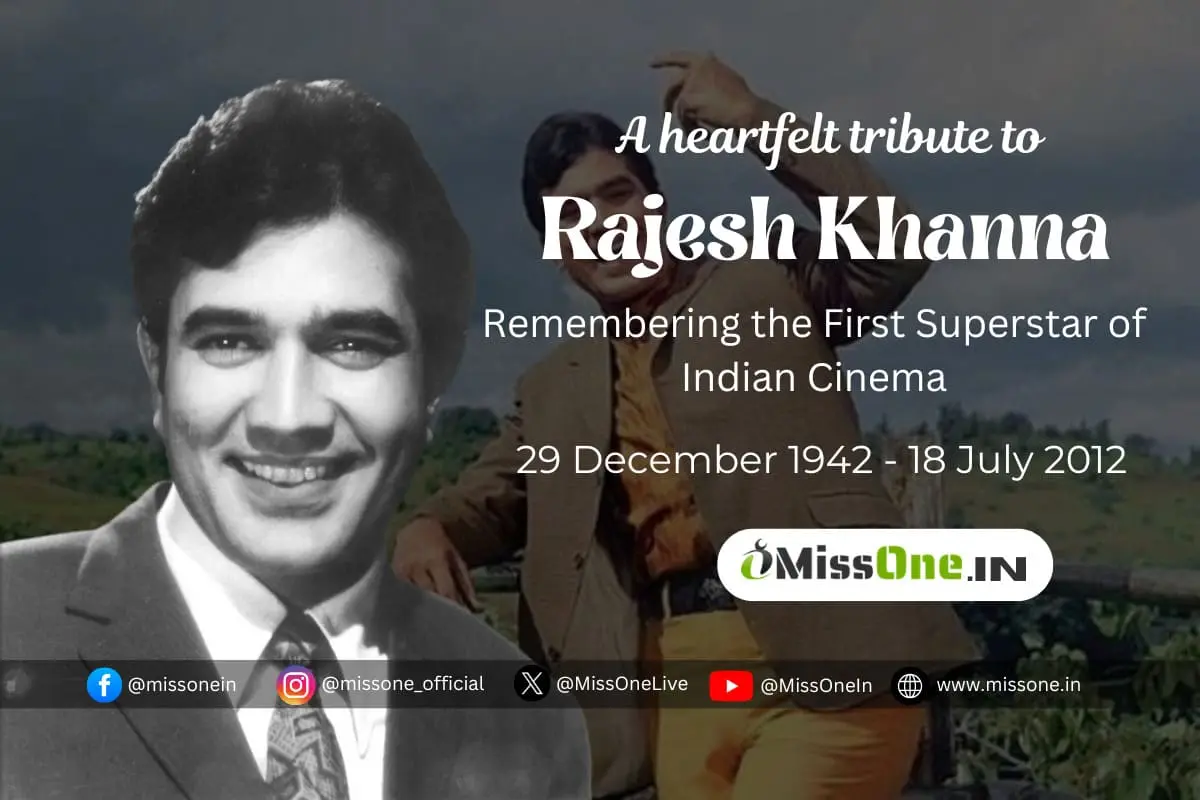On this solemn day, we pause to offer a heartfelt tribute to Rajesh Khanna, Bollywood’s first superstar, whose charm, talent, and charisma redefined Indian cinema. Known affectionately as “Kaka,” Rajesh Khanna’s soulful performances and magnetic presence left an indelible mark on millions. His journey from a young boy in Amritsar to the pinnacle of fame is a story of passion, perseverance, and unparalleled success. This tribute to Rajesh Khanna explores his childhood, family, illustrious film career, awards, and lesser-known facts that reveal the depth of his legacy, reminding us why he remains an icon.
You might like: Tribute to Dev Anand: Remembering the Evergreen Star of Indian Cinema
Early Life and Childhood: The Roots of a Star
Born as Jatin Khanna on December 29, 1942, in Amritsar, Punjab, Rajesh Khanna’s early life was shaped by unique circumstances. Adopted by his biological father’s relatives, Chunni Lal Khanna and Leela Wati Khanna, who were affluent railway contractors, he grew up in Mumbai after they relocated from Lahore in 1935. According to Yasser Usman’s biography, this adoption left an emotional impact on young Jatin, who grappled with feelings of abandonment. Despite this, his foster parents provided a supportive environment, enrolling him in St. Sebastian’s Goan High School in Mumbai, where he formed a lifelong friendship with Ravi Kapoor, later known as Jeetendra.
Jatin’s passion for acting emerged early, as he participated in school plays and won accolades for his dramatic flair. He pursued a Bachelor of Arts at Nowrosjee Wadia College in Pune and later studied at K.C. College in Mumbai, where his role as a wounded mute soldier in Andha Yug earned praise. His foster father initially opposed his acting ambitions, but Jatin’s determination led him to win the All India Talent Contest in 1965, beating 10,000 participants, marking the start of his cinematic journey. This tribute to Rajesh Khanna honors the roots that shaped a legend.
Family and Personal Life: Love, Loss, and Bonds
Rajesh Khanna’s personal life was as compelling as his on-screen roles, filled with love, heartbreak, and enduring connections. In the late 1960s, he was in a seven-year relationship with actress Anju Mahendru, which ended due to her reluctance to marry. In 1973, he married Dimple Kapadia, a 16-year-old fan and budding actress, eight months before her debut in Bobby. Their wedding, held at her father’s Juhu bungalow, was a grand affair attended by Bollywood’s elite, followed by a reception at Hotel Horizon. They honeymooned in Europe, joined by friends, and Rajesh threw a lavish party for Dimple’s 16th birthday at the Hilton Hotel, attended by Amitabh and Jaya Bachchan.
The couple had two daughters, Twinkle and Rinke Khanna, both of whom dabbled in acting, with Twinkle later becoming a renowned author. Rajesh and Dimple separated in 1984 but maintained a strong bond, reuniting as friends in the 1990s and appearing together at events. Rajesh also had a brief romance with Tina Munim in the 1980s, but his commitment to his family prevailed. Twinkle’s emotional tributes, like her posts on his anniversaries, reflect the deep familial love. This tribute to Rajesh Khanna celebrates the man behind the star, navigating complex relationships with grace.
The Rise to Stardom: A Tribute to Rajesh Khanna’s Film Career
Rajesh Khanna’s Bollywood journey began with his victory in the 1965 All India Talent Contest, leading to his debut in Aakhri Khat (1966), India’s first official Oscar entry for Best Foreign Language Film in 1967. Though it flopped, his early films like Raaz (1967) and Aurat (1967) showed promise. His breakthrough came with Aradhana (1969), directed by Shakti Samanta, where he played dual roles as a father and son. The film’s iconic song “Roop Tera Mastana,” shot in a single take, and its emotional narrative made him a national sensation, sparking “Rajesh Khanna mania.”
From 1969 to 1971, he delivered an unmatched 15 consecutive solo hit films, a record still unbroken, including Do Raaste, Sachaa Jhutha, Kati Patang, Anand, and Haathi Mere Saathi, the highest-grossing film of its time. His dialogues, like “Babu Moshai” in Anand, became cultural staples. He starred in 106 solo-lead films, a record, and only 20 multi-star projects, showcasing his dominance. This tribute to Rajesh Khanna celebrates the golden era when his name guaranteed box-office gold.

Iconic Roles and Collaborations: The Heart of His Legacy
Rajesh Khanna’s versatility shone in roles ranging from romantic leads to dramatic characters. His pairings with Mumtaz (all eight films were blockbusters), Sharmila Tagore, and Asha Parekh were legendary, enhanced by R.D. Burman’s music and Kishore Kumar’s voice. Songs like “Mere Sapno Ki Rani” (Aradhana), “Zindagi Ek Safar” (Andaz), and “Yeh Jo Mohabbat Hai” (Kati Patang) remain timeless. His role in Anand (1971), as a terminally ill optimist, earned him a Filmfare Best Actor Award, while Bawarchi (1972) and Amar Prem (1972) showcased his comedic and emotional depth.
He played double roles in 12 films, including Raaz, Aradhana, and Sachaa Jhutha, displaying his range. His meticulous involvement in music selection, often sitting with R.D. Burman and Kishore Kumar, ensured chartbuster soundtracks. A lesser-known fact is his fallout with R.D. Burman during Anurodh (1977), leading him to work with Laxmikant-Pyarelal instead. This tribute to Rajesh Khanna highlights the magic he brought to every role.
Awards and Accolades: Recognizing a Legend
Rajesh Khanna’s contributions earned him three Filmfare Best Actor Awards for Sachaa Jhutha (1970), Anand (1971), and Avishkaar (1974), with 14 nominations. He won four Bengal Film Journalists’ Association (BFJA) Awards for Best Actor, with a record 25 nominations, and seven All-India Critics Association (AICA) Awards. In 1991, he received a Filmfare Special Award for starring in 101 solo-lead films. In 2005, he was honored with the Filmfare Lifetime Achievement Award, followed by the Dadasaheb Phalke Legend Golden Actor Award in 2008 and the IIFA Lifetime Achievement Award in 2009.
Posthumously, in 2013, he was awarded the Padma Bhushan, India’s third-highest civilian honor. His legacy was further immortalized with a 2013 postage stamp, a bronze statue at Bandra Bandstand, and a fitness trail in Lajpat Nagar National Park named after him. This tribute to Rajesh Khanna acknowledges the accolades that reflect his monumental impact.
Political Journey and Later Years: Beyond the Silver Screen
In 1991, Rajesh Khanna joined the Indian National Congress, winning the New Delhi Lok Sabha seat in a 1992 by-election after losing to L.K. Advani in 1991, serving as MP until 1996. He acted sparingly during this period, appearing in Khudai (1994). Post-politics, he returned with films like Aa Ab Laut Chalen (1999) and TV serials like Ittefaq (2001) and Raghukul Reet Sada Chali Aayi (2008–09). He performed in a Rabindra Sangeet video album without payment and lent his voice to a 1992 stage production of Caligula.
Battling cancer, Rajesh passed away on July 18, 2012, at his iconic bungalow Aashirwad, purchased from Rajendra Kumar for Rs. 3.5 lakh. His funeral, attended by thousands despite heavy rains, reflected his enduring popularity. His last words, as cited by Amitabh Bachchan, were “Time is up, Pack up.” This tribute to Rajesh Khanna honors his multifaceted contributions.
Lesser-Known Facts: Unveiling the Man Behind the Superstar
This tribute to Rajesh Khanna would be incomplete without exploring lesser-known facets of his life that highlight his unique persona:
- Luxury Car Enthusiast: As a struggling actor, Rajesh drove an MG sports car to auditions, a rarity for the time. His father owned an MG Magnette Mark IV, MG Midget, and MG MGA Roadster 1600, reflecting the family’s affluence.
- Kashmir Connection: Rajesh had a deep affinity for Kashmir, insisting on shooting at least one song there in 15 films, including Aan Milo Sajna, Roti, and Avtaar, making it a “second home.”
- South Indian Impact: Despite the North-South linguistic divide (1965–1985), Rajesh’s films were adored in South India, running for 100–150 days in theaters. Many South Indians named their children “Rajesh” during 1969–1991, inspired by his charisma.
- The Treat Eatery: In the early 1990s, Rajesh gifted money to fan Vipin Oberoi to start “The Treat,” a Delhi food van dedicated to him, adorned with his posters and songs. Rajesh visited it over 500 times until 2011.
- Near Miss with Gulzar: Rajesh was set to star in a romantic film written by Gulzar, but a late-night meeting at Aashirwad, where Rajesh ignored Gulzar amid his “durbar” of hangers-on, led Gulzar to cast Jeetendra instead.
- Generous Gestures: Rajesh was known for gifting bungalows and cars to friends, reflecting his large-hearted nature, as recalled by actor Raza Murad.
These facts reveal Rajesh Khanna’s generosity, quirks, and widespread influence, adding depth to this tribute to Rajesh Khanna.
The Enduring Legacy of Rajesh Khanna
Rajesh Khanna’s legacy endures through his 74 Golden Jubilee hits (48 Platinum, 26 Golden), 22 Silver Jubilee hits, and a record 106 solo-lead films. His fashion trends, like the guru kurta and belted shirts, and his head-tilt gesture became iconic. Fans’ devotion was unmatched—letters written in blood, lipstick marks on his white Fiat, and even marriages to his photograph. A 1973 BBC documentary, Bombay Superstar, captured his frenzy, and a Mumbai University textbook included an essay, “The Charisma of Rajesh Khanna!”
Twinkle Khanna’s poignant words on his 10th death anniversary, “He is still here. In all our hearts,” echo his timeless appeal. Biographies by Yasser Usman and Narayanan Subramanian explore his complex life, while his films and songs remain cultural touchstones. This tribute to Rajesh Khanna celebrates a legend whose charisma continues to inspire.
Conclusion: Forever the First Superstar
As we commemorate Rajesh Khanna’s death anniversary, we honor a man whose passion and artistry shaped Bollywood’s golden era. From his Amritsar roots to his record-breaking career, Rajesh Khanna’s journey was extraordinary. His films, dialogues, and songs remain a gift to cinema lovers, while lesser-known facts reveal his generosity and unique charm. This heartfelt tribute to Rajesh Khanna celebrates a superstar whose light continues to shine, forever etched in India’s cinematic history.

